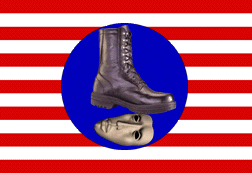April 15, 2009
Progressivism is Closet Fascism
 Conventionally, progressivism is thought of as a left-wing ideology, and fascism a right-wing ideology. But this is more a problem of the simplistic left-right political model than a valid insight. When we look at actual policies or ideology, progressivism and fascism start looking like kissing cousins, if not identical.
Conventionally, progressivism is thought of as a left-wing ideology, and fascism a right-wing ideology. But this is more a problem of the simplistic left-right political model than a valid insight. When we look at actual policies or ideology, progressivism and fascism start looking like kissing cousins, if not identical.What is progressivism? It is an ideology that favors the use of government action - the police power of the State - to promote social values. What these values are have varied with time. In the mid-1800s the thrust was primarily the abolition of slavery and alcohol prohibition. After the emancipation of slaves, temperance was still a major progressive goal, but also ending prostitution, assimilating "papists," passing blue laws, and elite control of education became the major moral concerns that (allegedly) had to be cured through government force.
There were also economic issues relating to industrialization and mass immigration, and the problems resulting from government subsidization of railroads, i.e. the lack of competition out west. Progressives of this era sought to regulate what immigrant children had to learn (good old pietist Protestantism) and how railroads (and later other industries) were permitted to operate.
Progressives were duped into thinking that "trust-busting" regulations were enacted to benefit the workers and the poor. As leftist historian Gabriel Kolko showed in "Railroads and Regulation: 1877-1916," this was not the case at all. The big existing railroad corporations supported the anti-trust regulations whole-heartedly. Why? Because their attempts to fix prices by forming a cartel failed in the (relatively) free market. Price-fixing cartels tend to be short-lived and unsuccessful because there is always a temptation for members to cheat. When someone has extra goods to sell due to artificially high prices, it is only rational to secretly sell them off at a lower price to clear the shelves. This works with everything, from railroad transport capacity, to oil, to Barbie Dolls.
But the big railroad corporations had a way to solve this problem of defection from their cartel - get the government to punish defectors. A cartel had a much better chance to maintain long-term price-fixing if defectors could be fined, imprisoned, and put out of business. And there was a bonus for using government-enforced cartelization. Regulations could be enacted that discriminated against smaller railroads without government pull, and barriers could be created to prevent new competition from startups. All for the public good, of course, to prevent "cut-throat competition" - a nasty sounding term for low prices. So the upshot was that big corporations screwed the working man by government-enforced price fixing, all the while advertising the scheme as "good for the working man." And the progressives bought it, hook, line, and sinker.
Once the railroad corporations pulled this off, corporations in other industries did the same. By the end of 1913, the railroad and shipping industry had the ICC cartel, the industrial farmers had the Agriculture Department cartel, and the banking industry had the Federal Reserve Board. We know how well these worked out for "the little guy." Today we have exaggerated boom-bust cycles due to the Fed banking cartel, and ultra-expensive medical services due to the AMA-run medical cartel.
What is fascism? Aristotle A. Kallis in "The Fascism Reader" wrote, "The most important claim made by fascism was that it alone could offer the creative prospect of a 'third way' between capitalism and socialism. Hitler, in Mein Kampf, spoke enthusiastically about the 'National Socialist corporative idea' as one which would eventually 'take the place of ruinous class warfare'; whilst Mussolini, in typically extravagant fashion, declared that 'the Corporative System is destined to become the civilization of the twentieth century.'" Corporatism is one of the defining characteristics of fascism. Corporatism is defined as a partnership between government and established firms characterized by regulatory government agencies that cartelize industries.
So now we see that the economic plan for both fascism and progressivism is corporatism. The only difference is the face it puts on for the public. Whereas progressivism puts on a populist pro-worker face, fascism puts on a patriotic nationalist face. Both require big powerful government and heavy-handed rulers. Both follow "fuhrerprinzip" - the leader principle. The US has its executive that can start wars at his whim, with his energy czars, food and drug czars, and financial regulatory czars with their respective fiefdoms.
People whose minds are shoehorned into the braindead left-right model tend to call the current US system "capitalist" (if they are lefties) or "socialist" (if they are righties) without ever having an inkling of the truth. We have a fascist system - a mixed economy to be sure, but essentially a "closet" fascist system called progressivism.
Related links:
Big Business and the Rise of American Statism by Roy A. Childs.
The Federal Reserve as a Cartelization Device by Murray Rothbard.